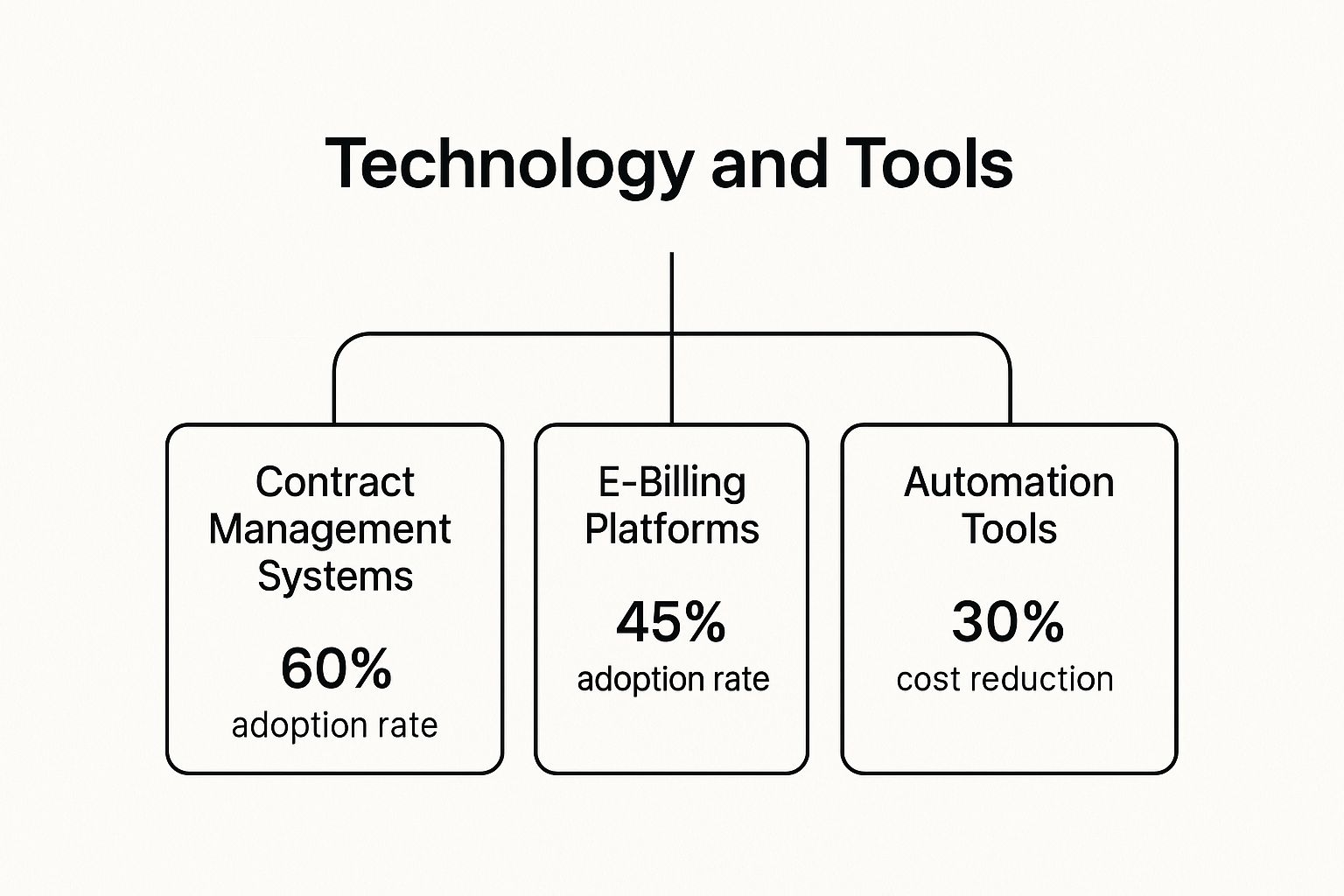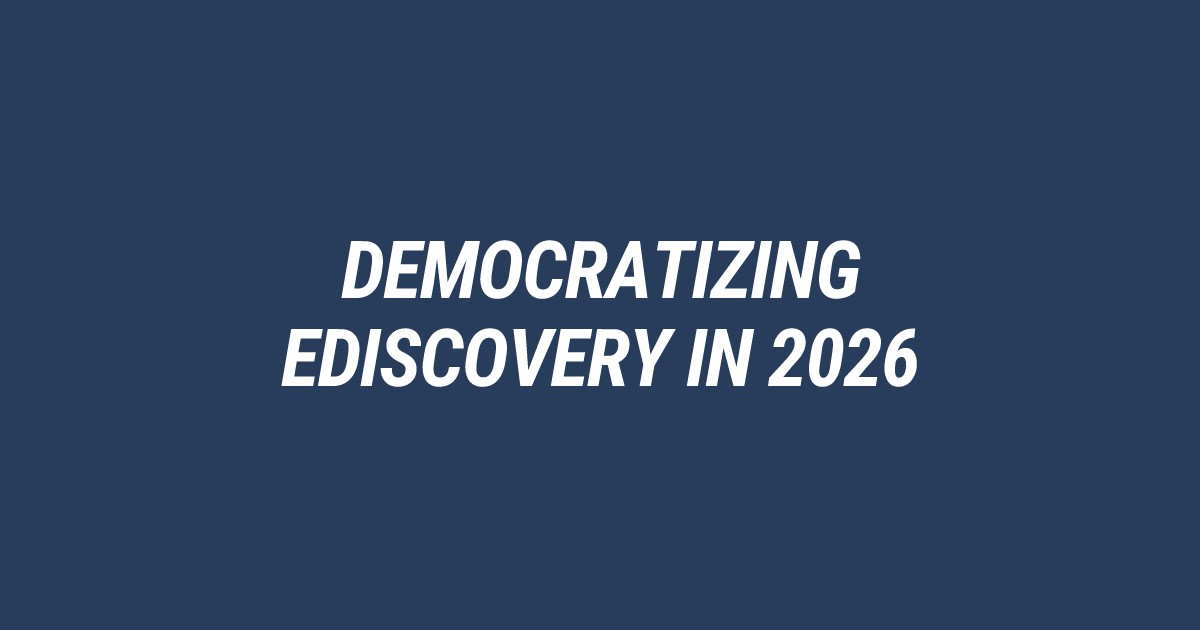By Pablo Tascon
Legal operations management is a fancy term for something pretty simple: applying solid business thinking to the work lawyers do. It’s not about practicing law itself. Instead, it’s about optimizing the business of law by wrangling technology, budgets, and processes. The goal is to free up lawyers to focus on high-value legal challenges, not administrative headaches.
Unlocking Efficiency: The Core of Legal Operations Management

Think of a legal department like an airline. The lawyers are your expert pilots, navigating complex legal skies and landing the company safely. But who makes sure the planes are maintained, flight paths are efficient, schedules are tight, and the whole operation stays on budget? That's the ground crew and air traffic control—and in the legal world, that’s your legal operations team.
This analogy gets right to the heart of legal operations management. It’s the central nervous system handling everything except the direct practice of law. Its core mission is to make the entire legal function run like a well-oiled machine: smoothly, predictably, and cost-effectively.
The Mission of Legal Ops
The rise of legal ops didn't happen by accident. Corporate legal departments are under immense pressure to deliver more value with fewer resources. A recent survey from the Association of Corporate Counsel (ACC) found that 60% of Chief Legal Officers saw their litigation expenses climb, all while many departments felt understaffed. This is exactly where legal ops comes in.
To get a clearer picture, let's look at the core functions that define a typical legal operations team.
Table: Core Functions of Legal Operations Management
| Core Function | Objective |
|---|---|
| Financial Management | Control costs, manage budgets, and improve spending predictability. |
| Vendor Management | Select and manage outside counsel and legal tech vendors for better value. |
| Technology Management | Implement and manage tools (e.g., e-billing, contract management) to boost efficiency. |
| Data Analytics | Use metrics to track performance, inform strategy, and demonstrate value. |
| Knowledge Management | Create systems for organizing and sharing legal knowledge and precedents. |
| Project Management | Apply project management discipline to legal matters for better outcomes. |
By zeroing in on these areas, legal operations turns a legal department from a reactive cost center into a proactive, strategic business partner. It’s a shift from just handling legal issues as they pop up to building a scalable, data-driven machine for delivering legal services.
"The legal operations function aims to make the delivery of legal advice to the broader business more efficient and impactful. It’s about running the legal department like a business."
Why It Matters Now More Than Ever
In the past, a legal department’s success was measured mostly by its courtroom wins. Today, success is just as much about operational excellence. Companies need their legal teams to be agile, tech-savvy, and financially responsible.
Without a dedicated legal ops function, lawyers often get swamped with administrative work—chasing invoices, haggling with vendors, or wrestling with clunky software. This doesn't just waste precious time; it pulls them away from the complex legal work they were hired to do.
Effective legal operations management provides the structure and strategy that modern legal teams need to thrive. It brings business discipline to a traditionally bespoke profession, creating a foundation for sustainable growth and proving the department's value in clear, measurable terms. This operational backbone isn't a luxury anymore—it's an absolute necessity.
The Evolution of the Legal Ops Professional

Not too long ago, legal operations was all about one thing: controlling costs. The job was created to wrangle budgets, get better rates from outside law firms, and stop legal spending from spiraling out of control. It was a necessary first step, but it was just scratching the surface.
Today, that role has blossomed into something far more strategic. A modern legal ops pro is an innovator, not just a cost-cutter. Their mission has shifted from simply saving money to actively creating value. This change signals a huge shift in how businesses see their legal teams—moving them from a cost center to a real competitive advantage.
The new thinking is that true efficiency isn't just about spending less. It's about building smarter, more resilient systems from the ground up. The focus is no longer on reactive budget management but on proactively designing how legal services get delivered.
The Rise of the Legal Engineer
A new type of professional is leading this charge: the legal engineer. This isn't your typical lawyer, nor are they just an IT specialist. A legal engineer is a hybrid expert, blending deep legal knowledge with a solid grasp of technology, data analytics, and process design.
They're fluent in the languages of both lawyers and software developers, acting as a vital translator between the legal department and the rest of the business. Their job is to pull apart complex legal workflows, find the bottlenecks, and then put them back together using automation and modern technology.
This isn't just a theory; we're seeing it happen now. It was predicted that technologists would eventually take over or enhance around 20% of in-house lawyer tasks, and that's precisely the trend unfolding. This highlights a massive pivot in legal operations, moving beyond cost control to architecting intelligent, data-driven systems that directly fuel business growth. You can explore more about these legal operations trends here.
From Optimization to Innovation
The difference between a traditional legal ops manager and a legal engineer is like the difference between optimizing an old map and building a brand-new highway. One makes the existing path a little better; the other creates a faster, more scalable route altogether.
For instance, a traditional manager might negotiate a 10% discount with a law firm for document review. A legal engineer, on the other hand, might build an automated workflow using AI to handle the first pass, slashing manual labor by 80% and letting lawyers zero in on only the most critical files.
A forward-thinking legal operations team doesn't just manage the present; it actively builds the future. They architect systems that allow a company to scale its business without a proportional increase in legal headcount or risk.
This innovative mindset delivers real, tangible business value. By creating scalable systems, legal ops empowers the entire company to move faster and with more confidence. Just look at these real-world examples:
- Automated Contract Generation: A legal engineer can set up self-service portals where the sales team can generate standard agreements like NDAs on their own, without waiting for a lawyer. This shrinks contract turnaround time from days to mere minutes.
- Predictive E-Discovery: Instead of having teams manually sift through millions of documents, they can implement AI tools that predict which files are most relevant to a case. This saves thousands of hours and potentially millions of dollars in discovery costs.
- Proactive Compliance Monitoring: They can build automated systems that track regulatory changes in real-time and flag potential compliance risks before they become major headaches, essentially future-proofing the company.
Ultimately, the evolution of the legal operations professional is a story of moving from a back-office support function to a strategic business driver. These modern experts aren't just managing legal work—they're re-engineering it to be smarter, faster, and perfectly aligned with the company's biggest goals.
Key Pillars of Effective Legal Operations
A strong legal operations function isn't something that just happens. It’s built on a foundation of distinct, connected pillars. Think of these pillars like the core systems of a high-performance engine—when each one is tuned just right, the entire legal department runs with more power, efficiency, and alignment with the business.
These pillars give a legal department the structure it needs to shift from a reactive support role to a strategic business asset. By mastering them, legal ops professionals build a framework that delivers predictable results and real, measurable value. Let's break down the four essential components that form the backbone of any effective legal operations strategy.
Financial Management
At its heart, legal operations is about bringing business discipline to the practice of law, and nowhere is that more critical than in Financial Management. This pillar is about much more than just paying the bills. It involves creating detailed budgets, meticulously tracking legal spend against those budgets, and forecasting future costs with a sharp eye for accuracy.
The goal here is simple: eliminate financial surprises and give the business predictable legal expenses. According to the Association of Corporate Counsel, 60% of Chief Legal Officers reported rising litigation costs, which makes disciplined spend management more important than ever. Effective financial oversight means every dollar is accounted for and put to work strategically.
This pillar acts as the department's financial conscience, making sure resources are used wisely. It allows legal leaders to answer tough questions from the C-suite with hard data, not just guesswork, proving fiscal responsibility and control.
Vendor Management
The second pillar is Vendor Management, which covers the strategic relationship with all external partners, from traditional law firms to Alternative Legal Service Providers (ALSPs). This isn't just about haggling for lower hourly rates. It's about building a roster of high-value partners who are genuinely aligned with your company's goals and efficiency standards.
A mature legal operations function uses data to size up vendor performance. They track metrics on case outcomes, budget adherence, and overall value to make smart decisions about which firms deliver the best results. This creates a competitive, performance-based environment where partners are chosen for their effectiveness, not just their brand name.
An effective vendor management strategy transforms outside counsel from a simple necessity into a strategic extension of the in-house team, ensuring the company receives maximum value for its external legal spend.
This strategic approach often involves:
- Creating preferred provider panels to consolidate work with top-performing firms, which can lock in better rates and service levels.
- Establishing clear billing guidelines to prevent invoice padding and ensure everyone follows company policies.
- Conducting regular performance reviews with key firms to talk through results, challenges, and ways to improve together.
Technology Management
Technology is the engine that drives modern legal operations. This pillar involves choosing, implementing, and optimizing the department's entire legal tech stack. The right tools can automate repetitive tasks, provide crucial data insights, and free up lawyers to focus on high-value strategic work where they're needed most.
A tech stack is no longer a luxury; it’s a fundamental part of a functioning legal department. A well-managed technology ecosystem ensures that processes run smoothly, data is accessible, and the team has the tools it needs to succeed.

Legal tech is not just about having the latest gadgets; it's about making smart investments that solve real problems. A thoughtfully curated tech stack turns a good legal department into a great one.
Choosing the right technology can feel overwhelming, but breaking it down by function helps clarify what each tool brings to the table.
Technology in Legal Operations A Comparison
The table below offers a comparative look at different types of legal technology, their primary use cases, and the key benefits they bring to a legal operations team.
| Technology Type | Primary Use Case | Key Benefit |
|---|---|---|
| Contract Lifecycle Management (CLM) | Automating contract creation, negotiation, and storage. | Speeds up deal cycles and reduces contract risk. |
| E-Billing & Spend Management | Tracking and managing legal spend with outside counsel. | Provides clear visibility into costs and enforces billing guidelines. |
| E-Discovery Platforms | Managing the collection, review, and production of electronic data for litigation. | Lowers review costs and improves accuracy in discovery. |
| Matter Management Systems | Centralizing all information related to a specific legal matter. | Improves collaboration and provides a single source of truth. |
This comparison shows that while tools like CLM systems are widely adopted, there's still a huge opportunity in automation to drive significant cost reductions. For a deeper dive into this area, explore our comprehensive guide on contract management best practices to learn how to maximize the value of these critical systems.
Data Analytics
The final, and perhaps most crucial, pillar is Data Analytics. This is what ties everything else together, turning raw information into actionable business intelligence. An effective legal operations function is data-obsessed, using metrics to measure performance, spot trends, and make smarter, evidence-based decisions.
Without data, you're flying blind. Legal ops professionals use analytics to answer critical questions: Which law firms provide the best value? How long does our contract review process really take? Where are the biggest bottlenecks in our legal workflows?
By tracking Key Performance Indicators (KPIs) like legal spend as a percentage of revenue or contract cycle times, the team can demonstrate its value in concrete terms. This pillar is what elevates legal operations from an administrative function to a strategic one, using data to drive continuous improvement and align the legal department’s efforts directly with the company’s bottom line.
How Technology and AI Are Reshaping Legal Ops
Technology, particularly artificial intelligence, is no longer a “nice to have” for legal departments—it's become a core part of the toolkit. In a world where legal teams are constantly asked to do more with less, tech is the lever they pull to meet those demands. It's the engine driving a massive shift in how legal work actually gets done.
The pressure on corporate legal teams is only growing. According to a recent report from the Corporate Legal Operations Consortium (CLOC), a huge 83% of legal departments are seeing more demand for their services. At the same time, 63% say workload and resource limitations are their biggest headaches. To bridge that gap, AI adoption has nearly doubled—30% of legal departments are already using AI, and another 54% plan to implement it within two years. You can read the full breakdown in the CLOC State of the Industry Report.
This data paints a very clear picture. Technology isn't just a trend; it's the direct answer to overwhelming demand and the only strategic way for teams to scale their impact without just hiring more people.
AI Applications Changing the Game
Artificial intelligence is finally moving out of the lab and into the real world of legal operations management. These tools aren't here to replace lawyers. They’re here to augment their skills, freeing them up to focus on high-value strategic thinking instead of getting bogged down in repetitive, time-sucking tasks.
A few key areas are already feeling the impact:
- AI-Powered Contract Review: Instead of spending hours poring over standard agreements, lawyers can use AI to analyze contracts in seconds. These tools instantly flag weird clauses, spot potential risks, and check for compliance with company rules, which dramatically speeds up the entire review cycle.
- Automated eDiscovery Processes: The discovery phase of a lawsuit can churn out millions of documents. AI platforms can sift through all that data, pinpointing relevant files and flagging privileged information with a speed and accuracy a human team could never hope to match. This slashes both review times and costs.
- Predictive Analytics: New AI tools can even analyze historical case data to forecast litigation outcomes, predict potential settlement ranges, and even guess at judicial behavior. This gives legal departments a data-driven edge, helping them assess risk with far more accuracy.
These tools prove that AI helps legal pros work smarter, not just harder.
By automating the high-volume, low-complexity stuff, technology frees up legal professionals to concentrate on the nuanced, strategic work that truly drives business value. This is the central promise of modern legal operations.
Navigating the Implementation Journey
While the potential of AI is huge, getting it right requires a thoughtful, realistic approach. It’s not as simple as just buying new software; it involves a cultural shift and a real commitment to managing change. The human side of the equation is just as important as the tech itself.
A major part of this journey is tackling the ethical questions that come with using AI in legal work. Ensuring fairness, transparency, and accountability is non-negotiable. As you navigate these complexities, it's critical to stay informed about the ethical frameworks shaping AI in legal practice. You can find more details in our guide on key ethical considerations for law firms using AI in legal review.
The path to using technology well involves a few practical steps:
- Identify the Biggest Pain Point: Don't try to solve everything at once. Start with a specific, high-impact problem, like a painfully slow contract approval process or sky-high eDiscovery costs.
- Pilot and Prove Value: Pick a promising tool and run a small-scale pilot project. Use it to gather data, show a clear return on investment, and win over any skeptics on the team.
- Invest in Training and Adoption: A tool is only useful if people actually know how to use it. Proper training and ongoing support are essential to make sure the technology becomes part of the daily workflow, not just another ignored icon on the desktop.
Ultimately, technology is reshaping legal ops by turning legal departments into more agile, data-driven, and strategic partners to the business. By embracing these tools thoughtfully, legal teams can not only keep up with rising demands but also secure a real competitive advantage.
Measuring Success with Legal Operations Metrics

How do you prove that legal operations is actually working? While cost savings are an easy win to point to, the true value of legal operations management goes much deeper. To show its strategic impact, you have to move beyond gut feelings and spreadsheets into the world of data-driven metrics.
Think of a legal ops leader like a pilot. They rely on a dashboard of instruments to navigate, not just a view out the window. Key performance indicators (KPIs) are those instruments. They aren't just for looking back at what happened; they're forward-looking tools that show what’s working, what isn't, and where the next big opportunity for improvement is hiding.
Without data, you're flying blind and making decisions based on assumptions. With the right metrics, you can tell a powerful story of efficiency, value, and strategic alignment.
Identifying KPIs That Truly Matter
Not all data is created equal. The trick is to ignore the "vanity metrics" that look good on paper but don't drive meaningful action. Instead, you need to focus on a handful of KPIs that directly reflect the department's health and its contribution to the company's bigger goals.
Zero in on numbers that answer critical business questions. Are we spending our budget wisely? Are we a bottleneck for the sales team? Is anyone actually using that expensive new software we bought?
These questions lead straight to a set of core metrics that every legal operations function should consider tracking.
"Data provides the narrative for legal operations. It transforms the department's story from 'we think we're doing well' to 'we can prove our value with these specific results.'"
Some of the most impactful KPIs include:
- Legal Spend as a Percentage of Revenue: This is a high-level metric that puts your costs into a business context the C-suite immediately understands. It shows exactly how legal spending scales with company growth.
- Cost Savings and Avoidance: This tracks both "hard" savings (like negotiated discounts with law firms) and "soft" savings (like the value of risks you avoided through proactive compliance work).
- Contract Lifecycle Turnaround Time: This measures how long it takes to get a contract from the initial request to a final signature. A shorter cycle means the business recognizes revenue faster. Simple as that.
- Technology Adoption Rates: A powerful tool is useless if nobody uses it. Tracking how many team members are actively using your tech stack shows the real return on that investment.
Using Benchmarks to Set Meaningful Goals
Once you have your KPIs, how do you know if your numbers are any good? This is where industry benchmarks become essential. You need a reference point to understand where you stand and what "great" actually looks like.
Comparing your department's performance against industry peers helps you spot performance gaps and set realistic goals you can actually hit. This process is getting easier and more sophisticated as global data collection improves.
For instance, resources like the Law Department Management Benchmarking Report now track legal ops quality in great detail. The report pulls insights from 395 legal departments across 23 industries and 34 countries, giving you a detailed look at everything from cost management to tech adoption. You can explore these comprehensive financial and operational metrics to see how your team stacks up.
Turning Data Into Strategic Action
The real point of tracking metrics isn't to create pretty reports—it's to drive strategic change. Data should spark conversations and guide decisions.
Think of your metrics as a diagnostic tool. If contract turnaround time is lagging, the data points you to a specific problem area to investigate. Is the bottleneck in the legal review stage, or are contracts getting stuck waiting for business approvals?
Here’s how to make your metrics actionable:
- Build a Dashboard: Pull your key metrics into a simple, visual dashboard. This makes it easy for stakeholders to see performance at a glance without getting lost in the weeds.
- Hold Regular Reviews: Schedule monthly or quarterly meetings to talk about the numbers. Discuss the trends, celebrate the wins, and brainstorm solutions for areas that need a boost.
- Align with Business Objectives: Always tie your legal metrics back to the company's big-picture goals. If the company is focused on international expansion, you should be tracking metrics related to cross-border legal support.
By using data as a strategic asset, legal operations management moves beyond just managing costs. It becomes a function that actively optimizes resources, improves service delivery, and proves its indispensable value to the entire organization.
Got Questions About Legal Operations?
As legal operations management starts to pop up more and more, it’s natural to have questions. This whole function is about bridging the gap between practicing law and running a business, so getting your head around the details is crucial for anyone trying to build a modern legal team.
Let’s dig into some of the most common queries to clear things up.
What’s the Difference Between a Paralegal and a Legal Operations Pro?
While both roles are absolutely vital for supporting lawyers, what they do day-to-day is worlds apart. A paralegal’s work is tied directly to the substance of legal cases—they’re doing legal research, drafting documents, and helping manage a specific matter. Their focus is on the practice of law.
A legal operations professional, on the other hand, is focused on the business of the legal department. They aren't involved in individual cases. Instead, they’re managing budgets, rolling out new technology, analyzing performance data, and handling vendor relationships.
Here’s a simple way to think about it: a paralegal helps a lawyer win a case. A legal ops pro makes sure the entire department runs so smoothly and cost-effectively that the lawyers and paralegals can do their best work.
How Can a Small Legal Department Get Started with Legal Operations?
You don’t need a massive team or a huge budget to start seeing the benefits of legal ops. The secret is to start small. Pick one big, annoying problem and solve it. Trying to boil the ocean with a massive transformation project right out of the gate is a recipe for disaster.
First, pinpoint your department's biggest headache. Is it the black hole of contract management? Is outside counsel spend a total mystery until the bill arrives? Once you’ve picked your target, follow these simple steps:
- Map Out the Mess: Before you can fix a broken process, you have to understand it. Write down every single step, from start to finish, to see exactly where the bottlenecks and inefficiencies are.
- Look for Simple Tech: You don’t need a giant, complicated platform. Look for user-friendly tools that solve your specific problem. Many e-billing or contract management systems have plans designed for smaller teams.
- Find a Champion: Put one person in charge of the project, even if it’s just part of their existing role. This person will drive the initiative forward and get everyone else on board.
The goal here is to get one clear win. A successful first project builds momentum and makes a powerful case for bringing the legal ops mindset to other parts of the department.
What Are the Most Critical Skills for a Legal Operations Manager?
A great legal operations manager is really a sharp business professional who just happens to work in a legal environment. They need a unique mix of skills because their role touches everything from finance and technology to project management and people skills.
A successful legal operations manager is a change agent. Their most important job is to persuade highly intelligent, tradition-bound lawyers to embrace new ways of working by demonstrating clear, data-backed value.
The most critical skills boil down to these:
- Strong Financial Acumen: You absolutely have to be able to build a budget, track spending against it, and analyze financial data. This is non-negotiable.
- Project Management Expertise: Rolling out a new process or piece of tech is a project. It needs discipline to stay on time and on budget.
- Tech and Data Savviness: You need a solid grasp of the legal tech market and the ability to turn data into insights. This is especially true in complex areas like eDiscovery, where managing digital evidence requires a sharp technical and strategic eye. To learn more, check out our guide on applying legal risk management in eDiscovery.
- Exceptional Communication: The role is all about talking to people—lawyers, executives, vendors. You have to be able to get everyone aligned and manage the human side of change.
When you put these skills together, you get a strategic leader who can turn a legal department from a cost center into a genuine business partner.
At Tascon Legal & Ediscovery, we specialize in helping legal departments build efficient, modern operations. We source top UK-qualified legal talent, implement the right eDiscovery tools, and deliver training to upskill your team. Find out how we can support your legal operations goals.










